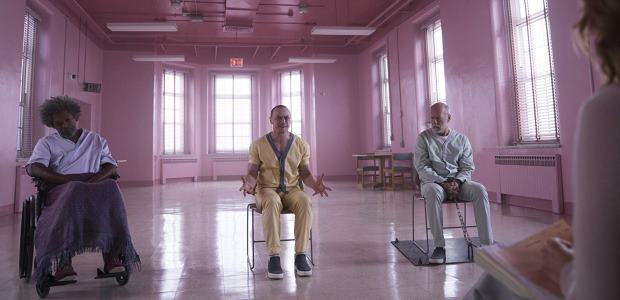As with most of his films, Writer-Director M. Night Shyamalan’s widely appreciated trait is to pull the rug under our feet during the film’s closing minute. Which is why we all thought Split was a psychological horror film until the last minute, where that final unbroken shot sweeps across a diner until it stops over Bruce Willis’ David Dunn. That’s when we realised we were watching the sequel to one of Shyamalan’s best films – Unbreakable. When Split revealed that it existed in the same universe as Unbreakable, it instantly positioned those films as two-thirds of a trilogy. And almost immediately after, Shyamalan revealed that Glass would be the finale to an idea gestating for nearly 20 years. That itself sounds like a labour of love for Shyamalan who not only embraces but also defies popular comic book logic.
Picking up roughly a few weeks after the climactic events in the previous film, Glass has Willis’ vigilante David Dunn, James McAvoy’s deeply disturbed serial killer Kevin Crumb, and Samuel L Jackson’s titular criminal mastermind assemble for a face to face showdown for the first time. You just have to wait for nearly the entire length of the film for that to happen. To get there, Shyamalan takes us through a long and elaborate setup where he’s showing us one thing but secretly doing something else; His preferred modus operandi maybe, but this time employing the illusion of delusion. Which is where Sarah Paulson joins the story as a psychiatrist whose speciality is in debunking people deluded into thinking they are superhuman. Read that again. In other words, there may have been others who think they are superheroes. This is the single most commendable idea in the entirety of this trilogy. It simply means that unlike popular characters from the Marvel and DC comics, Shyamalan’s superheroes are not from another planet, or a result of lab experiments gone wrong. It’s an idea that has immense potential, not only for this film but also for any indie filmmaker who wants to tell a superhero story in the future. Shyamalan got this right, but only in theory.
The execution is a different story, and why Glass is a shattered mess. As much as Dunn, Crumb and Mr. Glass are fleshed out characters on their own, they are strangely incompatible together. It’s as if Shyamalan has invested so much attention on their individual character development that he has overlooked the whole purpose of what they were meant to become. Instead, a lot of time is spent reintroducing the same characters again. That’s an unforgivable mistake for the final episode in a trilogy. The passage of time is also another questionable flaw. Dunn is seen in his rain poncho from 19 years ago and he is helped by his son Joseph track down petty street criminals. If not for a fully grown Spencer Clark Treat as Joseph, you would think nothing has changed since the first film. On the other hand, McAvoy was praised for his outstanding versatility in Split. Shyamalan knows that and so gives us a triple dose of McAvoy cycling between Hedwig, Kevin, Barry, Dennis, Patricia and even more of growling and wall crawling from The Beast. The air of mystery and terror turns to repetition, which feels like a stall for time and a full hour before Jackson’s catatonic Mr. Glass has anything to say. Have you ever seen a film where the notoriously verbose Samuel L Jackson does nothing but blink?
In time everything falls to pieces. The biggest problem with this film isn’t how disjointed the narrative is, or the unnecessary recap of the previous two films at laborious pacing, or even the complicated attempt at another twist ending. The problem is that despite nearly 20 years in the making, Glass feels unfinished and empty. Akin to the concept in the film, it’s like finding a solid gold bar and then throwing it out through a window.
Rating: 




